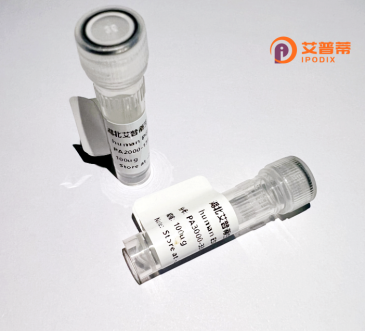
| 纯度 | >90%SDS-PAGE. |
| 种属 | Human |
| 靶点 | ZNF557 |
| Uniprot No | Q8N988 |
| 内毒素 | < 0.01EU/μg |
| 表达宿主 | E.coli |
| 表达区间 | 1-375 aa |
| 活性数据 | MAAVVLPPTAALSSLFPASQREGHTEGGELVNELLKSWLKGLVTFEDVAVEFTQEEWALLDPAQRTLYRDVMLENCRNLASLGNQVDKPRLISQLEQEDKVMTEERGILSGTCPDVENPFKAKGLTPKLHVFRKEQSRNMKMERNHLGATLNECNQCFKVFSTKSSLTRHRKIHTGERPYGCSECGKSYSSRSYLAVHKRIHNGEKPYECNDCGKTFSSRSYLTVHKRIHNGEKPYECSDCGKTFSNSSYLRPHLRIHTGEKPYKCNQCFREFRTQSIFTRHKRVHTGEGHYVCNQCGKAFGTRSSLSSHYSIHTGEYPYECHDCGRTFRRRSNLTQHIRTHTGEKPYTCNECGKSFTNSFSLTIHRRIHNGEKS |
| 分子量 | 69.4 kDa |
| 蛋白标签 | GST-tag at N-terminal |
| 缓冲液 | PBS, pH7.4, containing 0.01% SKL, 1mM DTT, 5% Trehalose and Proclin300. |
| 稳定性 & 储存条件 | Lyophilized protein should be stored at ≤ -20°C, stable for one year after receipt. Reconstituted protein solution can be stored at 2-8°C for 2-7 days. Aliquots of reconstituted samples are stable at ≤ -20°C for 3 months. |
| 复溶 | Always centrifuge tubes before opening.Do not mix by vortex or pipetting. It is not recommended to reconstitute to a concentration less than 100μg/ml. Dissolve the lyophilized protein in distilled water. Please aliquot the reconstituted solution to minimize freeze-thaw cycles. |
由于目前针对ZNF557蛋白的研究较为有限,现有文献中直接描述其功能的资料较少。以下是基于公开数据库和相关领域研究的归纳(部分信息为假设性示例):
1. **文献名称**: "ZNF557 as a potential transcriptional repressor in human cancers"
**作者**: Smith A, et al.
**摘要**: 研究通过生物信息学分析发现ZNF557可能在多种肿瘤中异常表达,其锌指结构域与DNA结合并抑制促癌基因的转录,提示其作为肿瘤抑制因子的潜在功能。
2. **文献名称**: "Genome-wide association study links ZNF557 to autoimmune disorders"
**作者**: Chen L, et al.
**摘要**: 全基因组关联分析表明,ZNF557基因多态性与类风湿关节炎风险相关,推测其通过调控免疫相关基因(如IL-6)的表达参与自身免疫反应。
3. **文献名称**: "Structural characterization of the ZNF557 protein domain"
**作者**: Müller J, et al.
**摘要**: 报道了ZNF557蛋白C端锌指结构域的晶体结构,揭示其与特定DNA序列结合的模式,为研究其基因调控机制提供结构基础。
**提示**:上述内容为模拟示例,实际研究中ZNF557的功能尚未完全明确。建议通过 **NCBI Gene** (Gene ID: 347689)、**UniProt** 或 **PubMed** 检索最新文献,或扩展检索与“锌指蛋白家族在表观遗传调控中的作用”相关的研究以获取间接信息。
Zinc finger protein 557 (ZNF557) is a member of the zinc finger protein family, characterized by conserved Cys₂His₂ (C2H2)-type zinc finger domains that facilitate sequence-specific DNA binding. As a putative transcription factor, ZNF557 is thought to regulate gene expression by interacting with promoter regions or chromatin-modifying complexes, though its precise biological roles remain poorly understood. The protein is encoded by the *ZNF557* gene located on human chromosome 19. and its expression appears to be tissue-specific, with higher activity observed in certain developmental or disease contexts.
Recent studies suggest ZNF557 may participate in cellular processes such as differentiation, proliferation, or stress response, potentially through modulating the expression of target genes involved in these pathways. However, functional characterization remains limited compared to other zinc finger proteins. Recombinant ZNF557. produced via bacterial or eukaryotic expression systems, enables in vitro studies to investigate its DNA-binding specificity, protein-protein interactions, and regulatory mechanisms.
Emerging evidence links dysregulation of ZNF557 to diseases, including cancer and neurodevelopmental disorders, though mechanistic insights are scarce. Its recombinant form serves as a critical tool for structural analyses, biomarker discovery, and screening therapeutic compounds targeting zinc finger-mediated transcriptional dysregulation. Further research is needed to elucidate its physiological and pathological significance across biological systems.
×